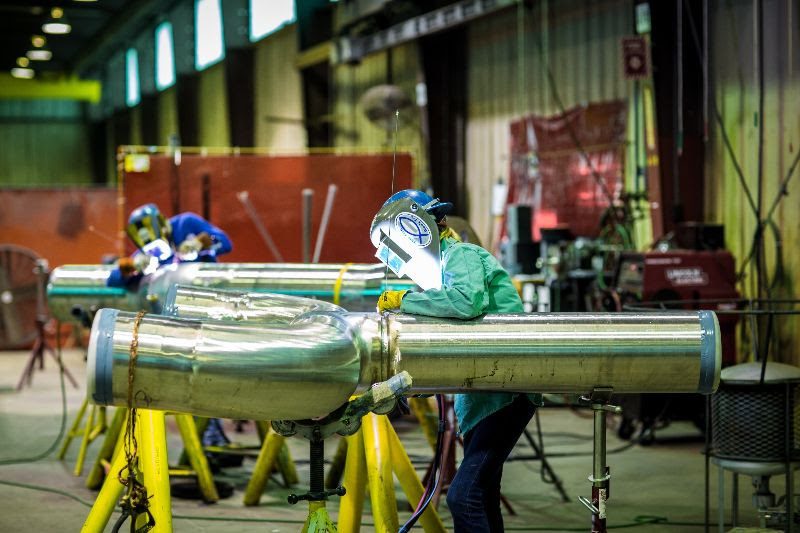Almost six hundred years ago, in 1480, Leonardo da Vinci sketched the plans for a machine to roll lead for stained glass windows.
The diagram was the world’s first recorded rolling mill which the artist-inventor designed to replace the small, hand-powered mills that had been in use for centuries to flatten and shape metals such as gold and copper for jewelry and weapons.
Though no evidence exists that says Da Vinci’s mill machine was ever built, a few centuries quickly passed and hot rolled-mills were producing the tens of thousands of tons of iron and steel that formed the skeleton of the great Industrial Revolution.
Today, the metal fabrication industry encompasses not only rolling steel and iron, but aluminum and titanium, but welding, forming, stamping, casting, forging, machining, punching, and bending metals into a limitless menu of products from refrigerators, door hinges, and bridge spans to fuel pipelines, aircraft components, and the ubiquitous humble ‘tin’ cans that contain everything from brake fluid to high-end energy drinks.
The scope of that ongoing Industrial Revolution is vast with projections that the global sheet metal fabrication services market, valued at $21.35 billion in 2024, is expected to reach $33.31 billion by 2034.

According to research analyst Technavio, the industry “is experiencing significant growth, driven by the increasing demand for fabricated metal parts in major end-user industries such as automotive, construction, and consumer goods.”
This trend, it says, “is attributed to the rising production of vehicles and infrastructure projects, as well as the growing preference for lightweight and durable metal components.”
The rising emphasis on sustainable practices is promoting the use of eco-friendly fabrication methods and materials. Additionally, demand for lightweight materials like aluminum and titanium in the automotive and aerospace sectors is growing as manufacturers seek improved fuel efficiency and reduced emissions.
The steel segment, says Technavio, “remains the leading material in the market in 2024 due to its strength, versatility, and cost-effectiveness.”
“Steel’s robustness, ease of handling, and recyclability make it highly desirable. It can be easily fabricated into various shapes and sizes, accommodating complex designs and intricate components.”
The aluminum segment, it says, “is expected to expand at the fastest compound annual growth rate (CAGR) over the projection period. This is mainly because of its light weight, corrosion resistance, and recyclability, all of which support sustainability goals and reduce long-term costs.”
Aluminum “naturally forms a protective oxide layer, making it suitable for outdoor and marine environments without additional coating. Its lower density compared to steel makes it ideal for applications where weight reduction is critical, such as in the automotive and aerospace industries. Advanced aluminum alloys offer exceptional strength, enabling use in demanding applications.”
The aerospace and defense segment dominated the metal fabrication market while holding a major revenue share in 2024, as these industries heavily rely on metal fabrication for developing aircraft and defense equipment components. Stringent requirements for high strength-to-weight ratios, precision, and durability in aircraft and defense components further bolstered the segment.
Aircraft parts must withstand extreme temperatures, pressures, and vibrations throughout their service life. The industry increasingly adopts lightweight, high-strength materials like carbon fiber composites, titanium alloys, and advanced polymers to meet performance standards.
The automotive industry is the second largest segment, holding a significant share last year. This is primarily because of its focus on lightweighting, fuel efficiency, and innovative manufacturing techniques. Automakers are increasingly using sheet metal with high strength-to-weight ratios to reduce vehicle weight and improve fuel economy.
Advancements in 3D modeling and laser cutting allow for the creation of intricate shapes and designs, enabling more complex vehicle architecture. The automotive industry is shifting toward sustainable practices, and sheet metal fabrication plays a role in using recyclable materials and optimizing production processes.
The electronics segment is expected to grow at the fastest rate in the upcoming period. This is primarily due to the increasing proliferation of smartphones, laptops, wearables, and other consumer electronics, along with the growing adoption of smart devices in industries such as healthcare and automotive. Manufacturing electronic components often require sheet metal fabrication.
Innovations in areas such as 5G, electric vehicles, and the Internet of Things (IoT) are major drivers of this growth, necessitating more complex and customized electronic enclosures and components.
Despite the surge in growth projections, the metal fabrication sector is confronting some significant challenges such as the advent of additive manufacturing technologies which are playing a crucial role in market expansion. The integration of robotics and automated systems, such as IoT devices and CNC machines, enhances efficiency, precision, and consistency in fabrication processes, contributing significantly to this growth.

The emergence of AI is also transforming the market by optimizing production, forecast potential issues, and enhancing quality control, all of which lead to lower costs and higher throughput. By analyzing historical data and real-time information, AI can assist in optimizing schedules, minimizing waste, and better allocating resources, resulting in faster, more accurate quotes and enhanced customer service, conclude several research studies on the subject.
AI-powered vision systems and sensors can also detect defects during fabrication, ensuring consistent quality and reducing rework. In manufacturing, AI-powered systems are used to automate and optimize several processes, according to industry analyst Precedence Research.
The growing adoption of automation and robotics to boost efficiency, precision, and safety, says Tecnavio, is also impacting how metal fabricators do business with fundamental operations such as welding, cutting, and material handling being impacted.
These robots, says Technavio, “perform repetitive tasks with high accuracy and speed, freeing workers to focus on more complex activities and streamlining workflows with automation helping reduce downtime, accelerate production cycles, and meet tight deadlines, all driven by the demand for faster, more accurate, and customizable production.”
Another chronic challenge is a shortage of skilled workers that require a high level of specialized training to handle an increasing number of fabrication techniques and technologies.
For example, a growing sub-sector of the industry that is hitting record growth is the fabrication of duct components used in the construction of factories, apartment complexes, event venues, and other megaprojects.
Beyond the basic tasks of fabrication, service, and installation, sheet metal workers are also having to step up to perform ancillary ductwork specializations such as TAB (testing, adjusting and balancing).
The experienced workforce with TAB skills is aging fast with the median technician now around 50 years old and, as demand surges for these skills on megaprojects, the industry faces a looming shortage just as the need for certified professionals reaches new heights.
The Virginia-headquartered National Energy Management Institute (NEMI) recently moved to fill that need with the unveiling of a new Megaproject Resource Center to help contractors keep pace with unprecedented workforce and training demands.
The web-based Megaproject Resource Center compiles vital resources for International Association of Sheet Metal, Air, Rail & Transportation Workers (SMART) members and Sheet Metal and Air Conditioning Contractors’ National Association (SMACNA) contractors.
The site offers a one-stop shop for technical education and advanced training in TAB and up-to-date certification pathways to help workers upgrade their skills and keep abreast of the latest metal fabrication and installation technologies being woven into the industry.
“We’re seeing a massive ramp-up in the size and complexity of projects, and the workforce needs are just exploding,” said Craig Reehten, Administrator at NEMI.
“For megaprojects like the Blue Oval plant, NEMI forecasted with Local SMART Leadership and contractor Systematic Testing & Balancing LLC that the workforce needed to perform TAB on 800 plus pieces of equipment and 35,000 air devices in the main building alone. That meant identifying needs, working with locals, and either augmenting training or developing new programs from scratch,” he says.
NEMI encourages sheet metal shops to “grow their own” — bringing in apprentices and providing concentrated, hands-on training to build the next generation of skilled professionals.
The School of Engineering at the University of Alabama at Birmingham (UAB) is also acting to fill the need to equip a new generation of tech-savvy metal workers.
The school recently partnered with the Metallurgical Engineering Trades Apprenticeship & Learning, or METAL, program “to transform the U.S. metal manufacturing workforce” in the metal fabrication industry by developing a national training network to sustain and bolster the base metals workforce through 2050.
METAL is supported by the U.S. Department of Defense’s Innovation Capability and Modernization (ICAM) Office in partnership with individual companies and the Institute for Advanced Composites Manufacturing Innovation (IACMI).
The METAL program at UAB will focus on automation, casting, forging and rolling techniques “critical to the metalworking and manufacturing industry future” and teach principles in the metallurgical fields, such as heat treatment of ferrous and non-ferrous alloys.
“We are excited to play a key role in shaping the future of manufacturing education and workforce development,” said Dr. Haibin Ning, a research assistant professor in the UAB Department of Mechanical and Materials Engineering.

The school, he says, “is always looking for solutions to address the challenges of modern manufacturing while providing students with the skills and credentials they need to succeed in the industry.”
METAL works with several universities, community colleges and trade schools, each of which houses facilities and equipment created either with or for the consortium.
In addition to the University of Alabama, IACMI has partnered with the University of Tennessee and the economic development offices of Colorado, Ohio, Tennessee, Michigan, and Indiana to expand the program beyond the U.S. Southeast.
Through a combination of online and in-person training, participants will learn a series of skills such as CAD design and 3D printing of patterns, metal casting and fabrication, material testing, and machining. The hands-on experience and essential technical skills can prepare participants to receive future academic credits, industry certifications, and apprenticeships.
In Pennsylvania, the Washington Greene County Job Training Agency recently received a $300,000 grant from the non-profit Richard King Mellon Foundation to support the development of training programs for a new generation of steel workers in the Monongahela Valley.
In partnership with the Southwest Corner Workforce Development Board, the Pennsylvania Steel Alliance, and at least 10 Mon Valley steel businesses and community organizations, the agency will develop training programs for at least 100 participants and include “experiential learning opportunities” for 20 youths.
Over the past few months, to keep pace with the metal fabricationʼs current surge in growth, a number of metal fabricators across the country have unveiled plans to expand their operational footprints.
Some examples…
- In June, the Manufacturing Corp. of America (MCA) expanded its capabilities with the acquisition of Fossil Industries, the Hunker, Pennsylvania-based metal fabrication company.
The move, said Florida-headquartered MCA, strengthens its ability “to deliver integrated manufacturing systems to its customers with an investment in advanced technology and intelligent software.”
Utilizing the latest fiber lasers and CNC equipment, the company offers welding services, 3D design, and precision sheet and tube cutting to tight tolerances.
MCA has plans to double the size of Fossil’s approximately 40,000-square-foot plant in Westmoreland Technology Park II, a 143-acre development in Westmoreland County. - Metal fabricator Alpha Sheet Metal Works has said it will pump $3.7 million into expanding its Ladson, South Carolina, facility by more than 24,000 square feet.
The investment “will further the company’s Computer Numerical Control machining, assembly and large-format fabrication capabilities,” says company President Joseph W. Schady.
“We’re thrilled to expand our operations in Charleston County,” he said. “Our expertise in steel, stainless steel, and aluminum fabrication, combined with our commitment to quality and customer satisfaction, makes us well-suited to meet the region’s diverse needs.” - In June, United Alloy opened the doors at its newly expanded manufacturing facility in Union, Ohio.
The plant produces data center fuel tanks and engine room exhaust plenums and was enlarged by an additional 350,000 sq. ft. to the previously announced 174,000 sq. ft. at a cost of $48 million.
Offering metal fabrication, welding, and powder coating capabilities, the Janesville, Wisconsin-headquartered company produces metal fuel tanks, reservoirs, skids, frames, chassis, trailers, heavy metal fabrications, and complex weldments. - Flow Intl. Corp. of Kent, Washington, a manufacturer of ultrahigh-pressure waterjet cutting systems, has launched a new division ‒ Flow Fabrication ‒ that adds laser cutting and press brake capabilities to the company’s portfolio.
Flow Fabrication’s new laser cutting system “is designed for high-speed, clean metal cutting. The press brake systems provide precise metal forming capabilities, allowing manufacturers to streamline production from cutting to final shaping within a single integrated ecosystem,” the company said. - Metal fabricator TSM Metal Works recently announced plans to build a $500,000 manufacturing facility in Crossville, Tennessee.
The 30,000-sq.-ft. location will serve TSM’s national customer base of construction, agriculture, and equipment manufacturing companies with laser cutting and metal forming services. - Maryland-based Baltimore Fabrication has said it will invest more than $6 million to expand its manufacturing operations in York County, Pennsylvania.
The project calls for the construction of a 35,000-square-foot manufacturing facility close to its existing plant and will result in the creation of at least 75 new jobs over the next three years and retain 47 current positions.
The company fabricates and erects steel frames for buildings, including beams, columns, trusses, decking, bracing, and other structural members. They also handle miscellaneous metal fabrications, such as staircases, railings, ornamental and decorative work, as well as other custom metal components. - Paragon Metal Fabricators has said it will invest $6 million in the construction of a new metal fabrication facility in Pendleton County, Kentucky.
The planned facility will be the company’s second in the state and will feature state-of-the-art sheet and tube lasers and forming machinery. - Williamsburg County, South Carolina-headquartered Andrews Fabricators is adding 30,000 square feet and a new precision sheet metal fabrication line to its existing facility there.
The company said the $3 million investment, slated for completion in mid-2026, will significantly increase its production capabilities and give it the wherewithal to better serve its 60-plus industrial clients in six states. - Fabricators Supply, a custom machining and metal fabrication company, is expanding its operations in West Point, Miss.
The $2.675 million project will add enhanced laser fabrication to the company’s current operations and is expected to create 15 jobs.
The company, founded in 2001, offers a range of metal fabrication services including drilling, pressing, milling, plasma cutting, and design. - The family of companies managed by Olathe, Kansas-headquartered Webco Group Holdings Inc. offer precision metal fabrication services for the aviation ground support, construction equipment, industrial cooling, mining, structural product, trucking, and data center sectors. The Group recently completed the acquisition of BMF Metal Fabrication LLC, a provider of precision-fabricated products of steel, aluminum, and stainless steel. The Winfield, Missouri-based fabricator specializes in sheet and plate laser cutting, precision forming, MIG and TIG welding, spot welding, light machining, hardware insertion, powder coating, plating, and assembly.





